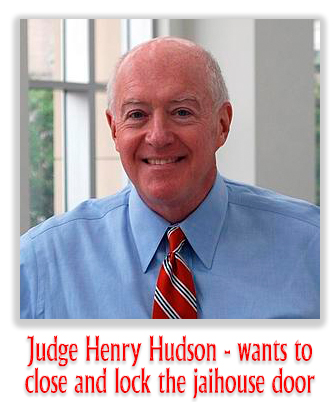We post news and comment on federal criminal justice issues, focused primarily on trial and post-conviction matters, legislative initiatives, and sentencing issues.
FOUR FOXES NOMINATED TO GUARD SENTENCING COMMISSION HENHOUSE
The U.S. Sentencing Commission, currently considering a “first offender” proposal that would reduce the Guidelines of people with no prior record, had better act quickly. Last Thursday, President Trump announced four nominees to the Commission, three federal judges and a guy named Bill Otis. All of them will require Senate approval.
 Otis’ nomination marks one of Trump’s most powerful statements yet against sentencing reform. A man described as “a prominent pro-prosecution crusader,” Otis has a history as the worst kind of AUSA, a guy who oversaw criminal prosecutions without ever actually doing any of them himself. He is a vigorous advocate for lengthy prison sentences and mandatory minimum laws (especially for drug sentencing, and is a staunch supporter of the Attorney General’s re-emphasis on them. He dismisses reformers as “pro-criminal” advocates who want to be “nice to drug pushers” by letting “robe-wearing partisans” impose more lenient sentences. And he supports life without parole for juveniles. Slate.com quotes him as writing that to avoid longer sentences, criminals should “consider quitting the smack business and getting a normal job like everybody else.”
Otis’ nomination marks one of Trump’s most powerful statements yet against sentencing reform. A man described as “a prominent pro-prosecution crusader,” Otis has a history as the worst kind of AUSA, a guy who oversaw criminal prosecutions without ever actually doing any of them himself. He is a vigorous advocate for lengthy prison sentences and mandatory minimum laws (especially for drug sentencing, and is a staunch supporter of the Attorney General’s re-emphasis on them. He dismisses reformers as “pro-criminal” advocates who want to be “nice to drug pushers” by letting “robe-wearing partisans” impose more lenient sentences. And he supports life without parole for juveniles. Slate.com quotes him as writing that to avoid longer sentences, criminals should “consider quitting the smack business and getting a normal job like everybody else.”
“Congress should abolish the Sentencing Commission,” Otis testified at a 2011 House Judiciary Committee hearing. “By far the most important purpose for which it was created no longer exists—to write binding rules for district courts to use in sentencing. It does have some secondary functions—for example, to study possible statutory improvements, as well as gather and publish statistics about sentencing practices—but when its core function has been demoted to making increasingly ignored non-rules, it’s time to turn the page.”
Otis’ appointment to the Commission “drew reactions of horror and condemnation from criminal justice advocates,” Reason.com reported. Those denouncing the choice ranged from the pro-inmate Families Against Mandatory Minimums and the conservative Cato Institute. Such criticism of Otis and Judge Henry Hudson of Virginia could make it harder for the full slate of four to win swift U.S. Senate confirmation. Before Trump’s announcement, criminal justice reform activists were quietly urging the White House not to nominate Hudson.
 Trump and Sessions appeared to have had a falling out last week, when the President called the AG’s handling of the FISA wiretap investigation “disgraceful.” Sessions then pushed back against the insult, saying he was presiding over DOJ’s investigation in a constitutional manner. But the next day, Trump nominated three Republicans and one Democrat to the USSC, and all three Republicans – Hudson, Otis, and Judge William Pryor – are Sessions allies. Of particular note is Hudson, known colloquially in Virginia as Henry “Hang ’em High” Hudson. Sessions recommended Hudson for the USSC in August 2017 and has now gotten his wish.
Trump and Sessions appeared to have had a falling out last week, when the President called the AG’s handling of the FISA wiretap investigation “disgraceful.” Sessions then pushed back against the insult, saying he was presiding over DOJ’s investigation in a constitutional manner. But the next day, Trump nominated three Republicans and one Democrat to the USSC, and all three Republicans – Hudson, Otis, and Judge William Pryor – are Sessions allies. Of particular note is Hudson, known colloquially in Virginia as Henry “Hang ’em High” Hudson. Sessions recommended Hudson for the USSC in August 2017 and has now gotten his wish.
The primary concern for inmates is that provisions like “First Offender,” even if adopted before the newbies are confirmed on the Commission, will never become retroactive. Retroactivity is usually decided after a new Guidelines provision is adopted, but the new appointees are unlikely to support that.
Slate.com, Law and Order: Dinosaurs (Mar. 1, 2018)
Business Insider, Trump’s sentencing panel picks may face uphill Senate path (Mar. 2, 2018)
Daily Caller, Trump’s Sentencing Commission Nominees Show He May Not be That Angry at Jeff Sessions (Mar. 1, 2018)
Reason.com, Trump Nominates Man Who Called for Abolishing U.S. Sentencing Commission to U.S. Sentencing Commission (Mar. 1, 2018)
– Thomas L. Root

